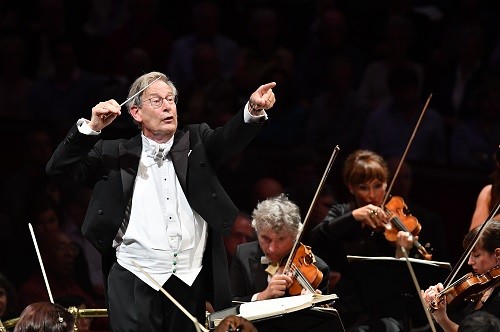 Switzerland Verdi: Corinne Winters (soprano), Ann Hallenberg (mezzo-soprano), Edgaras Montvidas (tenor), Gianluca Buratto (bass), Monteverdi Choir, Orchestre Révolutionnaire et Romantique / Sir John Eliot Gardiner (conductor), Kultur- und Kongresszentrum (KKL) Lucerne, 30.10.2018. (JR)
Switzerland Verdi: Corinne Winters (soprano), Ann Hallenberg (mezzo-soprano), Edgaras Montvidas (tenor), Gianluca Buratto (bass), Monteverdi Choir, Orchestre Révolutionnaire et Romantique / Sir John Eliot Gardiner (conductor), Kultur- und Kongresszentrum (KKL) Lucerne, 30.10.2018. (JR)

Verdi – Messa da Requiem
There are at least two ways to perform Verdi’s choral masterpiece, his Requiem. It can legitimately be considered operatic, and if you consider it more or less a sacred piece then you end up with the sort of fine performance Pappano conjured up just a few days ago on the Royal Opera House stage (review click here). Or you can treat it as a glorified oratorio, more secular than sacred, as you would somehow expect from the intellectual Sir John Eliot Gardiner and his trusted forces. After all, Verdi wrote this work not for a religious service, he was not a religious man. The work was a result of his own private grief, following a number of deaths of persons close to him, his own father, his father-in-law, composer and friend Rossini, and the novelist Alessandro Manzoni. One may lose some Italian heat and passion in a reading such as Gardiner’s but you make gains on clarity, precision and detail.
Gardiner performed the work just recently at Westminster Cathedral to great acclaim; he chooses his venues carefully, just as rehearses any work he performs down to the smallest detail. This performance is on European tour now and repeated performances make for recording quality performances.
This concert was kindly sponsored by Migros Kulturprozent Classics and as venue, they and Gardiner elected the KKL, without doubt Switzerland’s finest concert hall in terms of acoustics (and everything else). Outside Festival time, without international visitors, it is a big hall to fill, and it wasn’t quite a sell-out.
Gardiner picks his soloists with great care and has his favourites. Two, however, stood out throughout the performance: Swedish mezzo Ann Hallenberg’s rich timbre was always soothing, and her diction expressive. ‘Liber scriptus’ was hurled out imperiously, with wonderfully rolled ‘r’s. Gianluca Buratto, the Italian bass, was quite a character; his deep bass was a marvellous instrument and commanded attention. Latin sounded like his mother tongue, which it virtually is. Edgaras Montvidas, the Lithuanian tenor, started badly (I will admit there are some horribly exposed and unaccompanied passages for all voices in this work) but slowly improved. His unblemished ‘Hostias’ was impressive. Corinne Winters, the American soprano, was rather more variable, many gleaming high notes but also a rather unsettling tendency to sing sharp.
The stars of the show were undoubtedly the choir, which Gardiner set up an astounding 54 years ago. I counted 69 singers; they sounded like a choir of well over 100 when the dampers were taken off. There will not be a weak voice among them and many can step in for solos, perhaps not though in this work. The choir was crystal clear throughout, every word was crisp, some even almost spat out. ‘Calamitatis’ and ‘Rex tremendae’ were just two fine examples. Not for nothing are they in the top league of European choirs, and have been so for decades. The men are generally a bit older than the women, which adds to some richness in the bass register. Gardiner split up the men, left and right of the ladies, with both tenors and basses on either side. This meant the choral sound blended beautifully.
Gardiner is a master positioner; he had two trumpeters for the Dies Irae placed high in the hall, at the back, a thrilling coup de théâtre. He moved his female soloists back mid-orchestra for the Agnus Dei so they would not stand out too much. He had his horns stand at one stage (‘Mors stupebit’) to chilling effect. He placed the unusual cimbasso (bass trumpet) to the right of the trombones so we could all marvel at it.
The opening of the Requiem was magical. Gardiner began with the quietest of sound; when a latecomer then noisily took his seat in the stalls, Gardiner quite rightly stopped, waited, and started again. That was a signal to us all. At the very end, as ‘Libera me Domine’ died away, Gardiner held the silence and for a while it seemed that no one was brave enough to break it. A standing ovation erupted and said it all.
Gardiner’s ‘own’ post-baroque orchestra inevitably took a rather secondary role in the proceedings but did not put a foot wrong. The timpanist and bass drum player were eye- and ear-catching at all times.
Gardiner’s next major project with the Monteverdi Choir will be Handel’s Semele, next May. Enticingly, the London performance (May 2) will be at Alexandra Palace’s ‘new’ Victorian Theatre.
Gardiner now takes the Requiem on tour to Vienna (Nov 1), Budapest (Nov 2), Munich (Nov 4), Luxembourg (Nov 5) and Amsterdam (Nov 7). Do catch it if you can: you will not be disappointed.
John Rhodes